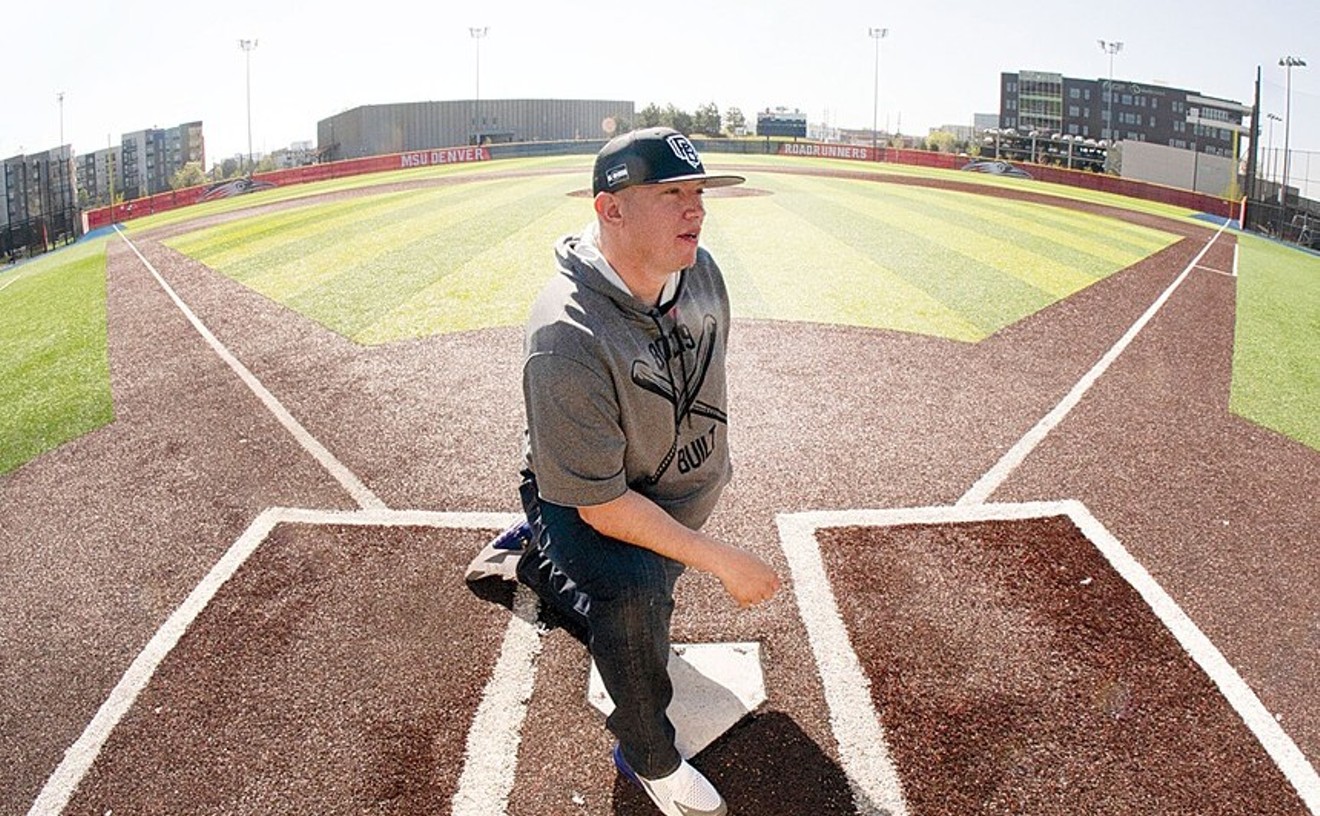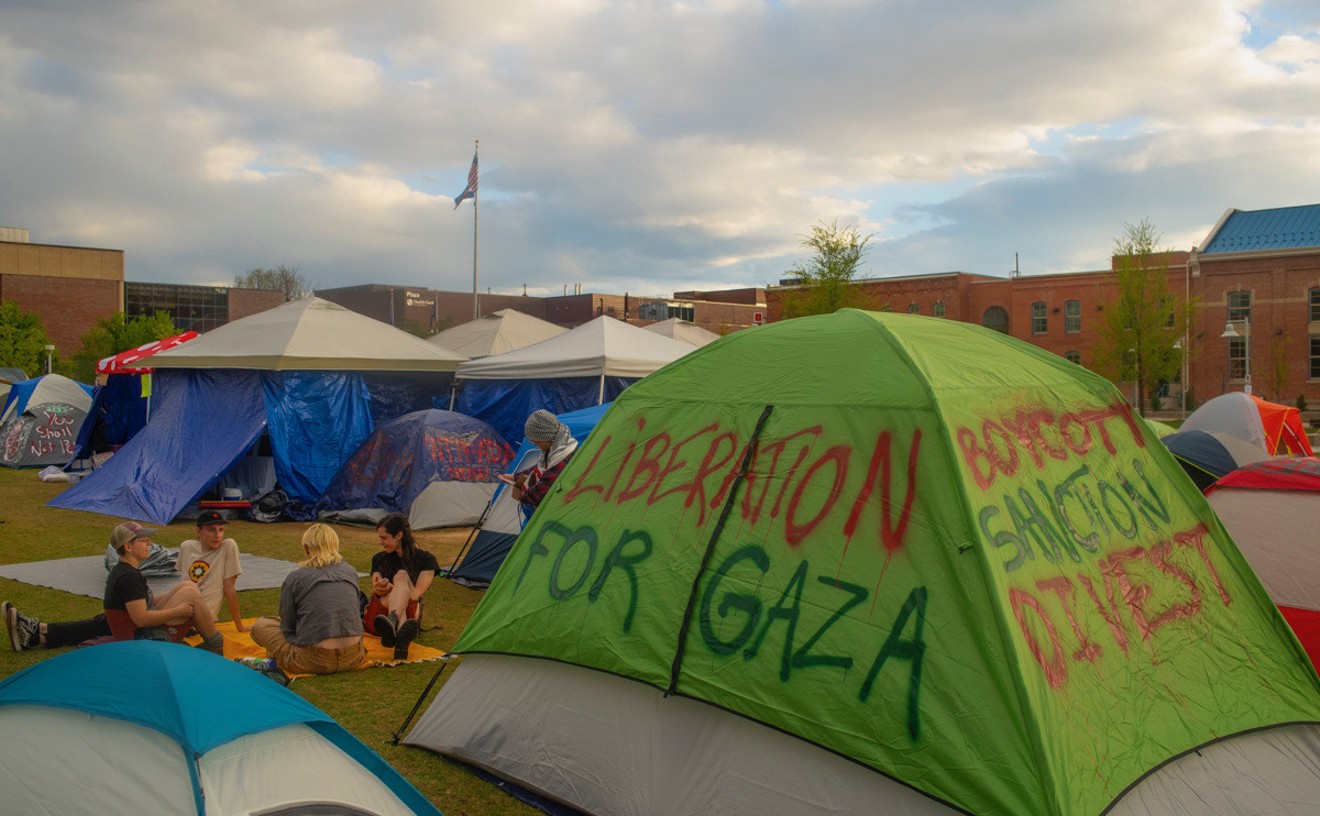It's been two years since secretary Jennifer Miller filed a lawsuit against the CU Board of Regents and her former boss, James Corbridge, the chancellor of the Boulder campus from 1986 until 1994, claiming harassment and discrimination during the six years she worked in the "sexually charged atmosphere" of Corbridge's office. The case has been shrouded in an unusual cloak of secrecy, and a trial scheduled for December 8 was abruptly postponed last week while U.S. District Court Judge Daniel Sparr considers a defense motion for summary judgment; Corbridge's attorneys contend that Miller hasn't provided sufficient evidence of harassment within a narrowly defined time frame to proceed to trial. But a recent hearing on the suit has already led to a public airing of some of CU's most embarrassing dirty laundry.
Miller's suit raises questions not only about Corbridge's treatment of her but about his dealings with several other female university employees--including high-ranking administrators--during the years he supervised day-to-day operations of the Boulder campus and its ten colleges. It also offers an insider's look at the snarled sexual politics, conflicts of interest and alleged coverups at the top levels of the university's power structure.
The case is one of several costly, high-profile sexual-harassment lawsuits that have rocked the state's most politically correct public institution over the past two years ("Fear and Groping in Boulder," June 6, 1996). But it may be the most bitterly contested one of all; while most of the other cases have resulted in out-of-court settlements that prevent the litigants from discussing their claims, the Miller lawsuit has proceeded practically to the eve of trial with much of the discovery process sealed under protective orders of a federal court. In addition, the university has shelled out thousands of dollars from its insurance pool to hire private attorneys to represent Corbridge and other key witnesses.
The cone of silence descended shortly after excerpts from the deposition of former CU president Judith Albino, which dealt with rumors she'd heard about Corbridge's alleged womanizing, surfaced in local dailies last year. Federal Magistrate Judge Donald Abram decided to seal future discovery in order to shield from undue "annoyance and embarrassment" various women whom Miller alleged had had personal relationships with Corbridge that advanced their careers.
Yet some of the most intriguing elements of Miller's case, including claims by other women that they were harassed by Corbridge, have appeared in the public record anyway. Two weeks ago Judge Sparr rejected a defense request to close a pre-trial hearing at which much of the evidence was discussed, despite Corbridge attorney Thomas Rice's contention that the evidence amounted to "colorful rhetoric and hyped-up allegations" designed to subject his client to public ridicule.
Miller's complaint states that Corbridge asked her for dates and then harassed her after she let him know his advances were "unwelcome and inappropriate"; that the chancellor rewarded those who responded to his attentions with extravagant raises, promotions, travel and other benefits, all at university expense; and that he punished and humiliated Miller for rejecting him and ultimately drove her into therapy and out of a job. She took a medical leave of absence from her $42,000-a-year job two weeks after Corbridge stepped down as chancellor and hasn't worked since, while Corbridge returned to a tenured faculty position in the university's law school.
Through his attorney, Corbridge declined to comment to Westword, but in court filings, he's denied virtually all of Miller's allegations. Rice and university attorneys have argued that Miller has failed to provide any evidence that the chancellor engaged in sexual liaisons with any of his staff or that any of them, other than Miller, felt harassed by him. They also contend that Corbridge's alleged consensual relationships with other university employees didn't affect Miller, who may not have been aware of them and who received "handsome" raises herself. And since many of the alleged incidents Miller describes--everything from "unsolicited backrubs" to Corbridge's supposed penchant for touching and embracing his female staff, which Miller says prompted her to try to keep furniture between herself and the chancellor at all times--occurred as far back as 1988, the defense insists that her case exceeds the statute of limitations for harassment complaints.
Still, while the legal val-idity of Miller's claims are very much in dispute, it seems clear that Corbridge's touchy-feely management style did provoke comment and speculation in the chancellor's office--and may have led to some highly unusual job duties. Miller claims that she was expected to arrange dates for Corbridge with other women, to find jobs for women he found attractive and to chill wine for after-hours get-togethers in his office. She also claims she was assigned to assist in getting Corbridge's house ready for his 1992 wedding to Pauline Hale, director of CU-Boulder's public-relations office. Attorney Rice says Miller's claims amount to "gossip-mongering" and "taking a pebble of sand and turning it into a dune."
In affidavits and depositions, other witnesses have portrayed Corbridge as a Bob Packwood-like figure who had difficulty separating personal and professional relationships--and created uncomfortable situations for other CU officials who were supposed to enforce campus policies discouraging such behavior. Susan Hobson-Panico claims to have once been kissed on the cheek by the chancellor outside his office; at the time, Hobson-Panico headed the Ombuds Office, which handles sexual-harassment complaints on campus in a confidential setting. In order to follow university procedure for complaining about such an incident, Hobson-Panico would have had to report the unwelcome buss to herself. Later promoted by Corbridge to interim vice chancellor, Hobson-Panico eventually relayed her concerns to the university's legal office.
Miller herself never complained of harassment to university officials, but her attorney, David Reese, says that's because she recognized the power of Corbridge's position and his strong support on CU's Board of Regents. "Can you imagine how intimidating it was for my client," Reese says, "to know that he got away with harassing his own ombudswoman?"
For various reasons, others didn't complain about Corbridge's behavior either. In an affidavit, CU law professor Mimi Wesson claims that the chancellor put his hand on her thigh under a table at a social gathering a few years ago. Wesson, whose specialty includes harassment law and who helped develop the university's policy on the subject, says she didn't make a fuss at the time because a student and her parents were sitting at the same table.
"Although I really wanted to tell the chancellor in no uncertain terms to get his hand off my thigh...I did not wish to cause a scene," Wesson states, adding that she maintains a "pleasant collegial relationship" with Corbridge.
Yet even when complaints did go through standard university channels, nothing came of them. One woman, a former staffer on the Boulder campus, claims to have had a five-year relationship with Corbridge that began as consensual but became more problematic as the months wore on.
"For six months it was a nice relationship, but it wasn't going forward," the woman, who asked that her name not be used, told Westword. "I spent four years trying to get out. It's really frightening trying to end a relationship with your supervisor's supervisor's supervisor."
Corbridge, she adds, was "persistent at getting what he wanted. He used every tactic he could think of. He was very good at it, in fact."
The woman has said she finally left a voice message for Corbridge telling him to leave her alone. She also turned over a copy of the message to the Ombuds Office. Months later, though, ombudsman Tom Seebok asked her permission to destroy the record of her complaint--an action that Miller's attorneys regard as a violation of university policy.
Corbridge attorney Rice maintains that such alleged relationships, even if they occurred, have no bearing on Miller's case. But Reese contends that other university employees who responded to Corbridge, and who Reese believes received promotions or higher budgets as a result, serve as "foils" to Miller's situation.
"All of these women put up with it," Reese argued at the recent hearing. "And all of these women were rewarded."
Corbridge left his post as chancellor in the summer of 1994, apparently after some prompting by then-president Albino, who'd heard secondhand reports of the chancellor being "overly familiar" with female employees, including a member of her own staff. "There were issues of concern about the image of the chancellor...and Jim's behavior toward women," Albino would later explain in a deposition. "I believed it would be best to make a change. We had this discussion, and he agreed that he would resign." (Rice denies that Albino ever raised harassment issues directly with his client.)
Reese says that the fact that Corbridge was able to continue as chancellor for so long, despite mounting concerns about his alleged conduct, is an indication that CU's internal procedures for dealing with sexual harassment, much revised in recent years, still don't work very well. The university's mania for confidentiality can, he suggests, benefit a harasser at the expense of victims, who may not be aware of similar complaints; and by the time a harassment case reaches the courtroom, CU is in the position of paying for outside counsel not only for the accused harasser but for other potential witnesses, giving the defense what Reese calls "leverage" over those witnesses.
Regardless of the outcome of Miller's lawsuit, the attorney says he and his client are determined to bring their concerns about the process to state legislators who oversee the university's budget and policies.
"The underlying problem needs to be remedied," he says. "What this case tells me is that the problem is so pervasive at CU that the victim will be attacked savagely for going up against the good-old-boy network. The process that's going on now is a real danger to everyone up there. The defense in this case is just to tear a decent woman to pieces."
The true cost of CU's efforts to defend faculty and administrators from harassment claims may never be known. In most cases, the strategy has been to buy the litigants' silence--and even when the university is compelled to provide information on a particular settlement, the figures provided may be misleading or incomplete.
Consider, for example, the recent settlement in the case of Kristine Larson, a professor in CU's aerospace engineering department who had objected to sexist postcards being posted at a federally funded research center housed at the university. Larson claimed that retaliation by her male superiors, along with inaction by officials such as Corbridge, transformed her relatively minor complaint into a major dispute over her performance evaluations, work assignments and prospects for tenure.
Three months ago, after more than two years of litigation and only weeks before the case was slated to go to trial, the parties reached an out-of-court settlement. Under the terms of the settlement, Larson can't discuss what she received, but CU spokeswoman Hale issued a statement announcing that Larson had voluntarily dismissed all claims in return for a $50,000 research grant and a light teaching load--one course per semester--for the 1997-98 academic year. Although a guarantee of tenure wasn't part of the package, Larson's acceptance of the deal clearly hinged on whether she was granted tenure, which she received a few weeks before the settlement was announced.
Judging by Hale's statement, the university--and Hale's husband, James Corbridge, at one point a named defendant in the Larson suit--got off easy. But the statement failed to mention that under a separate, secret agreement involving the release of Larson's claims against other faculty members, the university agreed to pay her attorney's fees.
According to documents obtained by Westword under an open-records request, CU paid Larson $172,773 out of its insurance pool in addition to the research grant and the light teaching load. The university's insurance pool also paid $50,000 in legal fees for the private attorneys hired to defend the faculty members Larson named in her lawsuit.
In other words, the real cost of settling Larson's harassment claim was more than four times greater than the university was willing to admit. But then, who wants to admit that they're paying for both sides of a lawsuit--and coming out the loser every time?
Visit www.westword.com to read related Westword stories.











